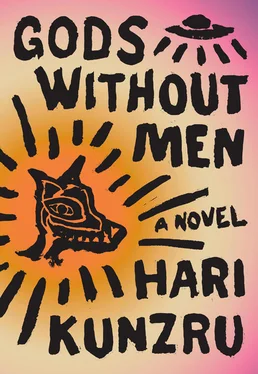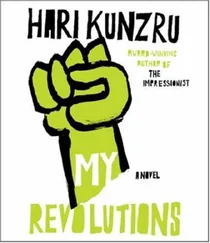“He’s dead, isn’t he? Some pervert has got him.”
“Don’t say that.”
“You think he’s alive?”
“Yes, I do.”
“You don’t know.”
“No, I don’t know. But I believe.”
“I don’t understand.”
“I’m feeling positive. I think it’ll come out right. That’s all I’m saying.”
“No, you’re saying you believe . That’s not the same. Your belief, Jaz? What’s that worth? I don’t even know what the word means to you.”
He couldn’t understand why she was so angry. Did she mean religion? That never used to be part of their lives. Religious belief wasn’t some precious commodity. It was everywhere. On a good day he thought of it as something like smoking — a bad habit that society was gradually breaking. On a bad day it seemed more a type of low-level mental illness. People who had it could be irrational, violent. His parents, for example, still trying to use God to control the family. As a scientist, he could term it an evolutionary throwback, perhaps with some residual social function — that was the kind of explanation he gave at dinner parties when asked about Al-Qaeda or Sarah Palin. So the honest answer to Lisa’s question was probably nothing; his belief was worth nothing at all. But that wasn’t what he’d meant. He’d only been trying to reassure her.
That night he went back to the Williamsburg Bridge, to a spot partway across, a kind of cage where he could sit back against a spray-tagged slab and watch the cyclists tear past. If he was a man of faith, maybe he would have found consolation? Or at least had a plan. A road map; some picture of the future. The cold was seeping through his jacket, so he got up and walked into Manhattan, wandering aimlessly downtown into the Financial District until he found himself outside the building on Broad Street where he used to work. He stood there for almost an hour, looking up at the mosaic of lighted windows, thinking about the Walter model and causality and guilt. If the world was made of signs, why couldn’t he read it? He had to be some kind of fool. All he could say for sure was that everything was connected — Raj, Walter, the desert. A bloom of paranoia grew up in his mind; he felt as if he was being watched by someone on one of the upper floors. Binoculars or a rifle sight. He walked away, trying to measure his pace. It took all his concentration not to break into a run.
It didn’t feel like coincidence when he got a call from Fenton the next day. “Were you watching me?” Jaz asked. Fenton said he didn’t know anything about that, but Jaz should listen up. He was sorry to have to do it, but they were letting him go. There was a long silence, while Jaz failed to formulate a reaction. He’d forgotten this part hadn’t happened yet.
The package was generous. Fenton said he felt bad, but things at the firm needed to move on and because of Jaz’s “family troubles” he wasn’t in a position to contribute. The old ham managed to sound as if losing “such a valued colleague” was a personal blow. Jaz appreciated that he was trying to be kind. He even offered to engage a private detective to help search for Raj.
“I can’t accept that from you, Fenton.”
“Don’t be so hardheaded, Jas-win-der. I mean it. It’s the least I can do.”
He sounded sincere enough, but he didn’t repeat the offer. Now that the deed was done, neither of them knew what to say.
“I’m sorry to do this on the telephone, but the idea of you having to drag your ass downtown …”
“I understand. Thanks.”
“Well. Then …” Fenton’s voice was uncertain. “Good-bye.”
He sounded relieved to end the call.
So there it was. He was free. Now there was absolutely nothing to distract him from the pain.
He spoke to Lisa every day on the phone, but it was more ritual than real conversation. She seemed better than before; camped in her parents’ spare bedroom, she was beginning to pay some attention to the world around her, even managing a few weak jokes at her mother’s expense — about the floral wallpaper she’d chosen for the house, the fussy little pouches of potpourri hanging over the closet door handles. The calls were never long. Jaz felt as if they were going through the motions with each other, priests of a faith they no longer believed in.
“How are you?”
“I’m doing OK. You?”
“Fine. Are you sleeping?”
“I have the pills.”
“What else are you doing?”
“Mom wants me to help her in the garden.”
“Does anything actually grow out there? It’s like Dune .”
“You’d be surprised. She’s got this cactus thing going on. She has plans for a wishing well.”
“Nice.”
“Isn’t it?”
“I spoke to the contractor. He knows we don’t want to go ahead with the remodeling.”
He waited for her to say something.
“So you don’t have to worry about any of that.”
“I’m tired, Jaz. I should go rest.”
“What time is it there?”
“Time?”
“Is it still light where you are?”
“Yes.”
“I miss you.”
“Sure.”
“Come home. You should be at home.”
“I don’t know.”
“I do.”
“At least here I’m not too far if—”
“Sure.”
“Look, I really am tired.”
“OK. I’ll let you get to bed. I love you.”
“I love you, too.”
Click.
Afterward, after one of those calls, the house would feel like a huge parquet-floored coffin. He’d look around without recognizing anything. So much stuff, so many tennis rackets and dinner plates and tastefully framed prints. Were they really his? He stopped sleeping in Raj’s room; the accusatory stares of the stuffed animals were too intense. Retreating to the master bedroom, he lay awake at night. He could sense the mass of clothes and shoes stacked behind the looming closet doors, threatening to spew over him in a tidal wave of wool and sea-island cotton.
He wanted to begin again, to be unformed, a fetus floating in warm amniotic fluid. One day, walking through SoHo, he went into a Japanese store that specialized in generic clothes and bought himself jeans, a gray T-shirt and a pair of white tennis shoes. He changed into them in the store and stuffed his other clothes into a plastic bag. He felt unburdened, glad to be free of their irritating particularity, their trace of the past. Later he gave the bag to a homeless guy outside the Astor Place subway. He kept walking until it got dark, a generic man in motion through the streets of his generic city. Finding himself outside an anonymous business hotel in Midtown, he checked in. He rode the elevator to his floor, slotted the keycard into the holder by the door, and when the lights clicked on, switched them off again. Unusually for New York, the window opened. He lay down on the bed in the twilight, listening to the traffic noise filtering up from the street. There was nothing to remind him of his own life. It was just the sound of a city, any city; an ant colony in which he was an ant who’d followed a pheromone trail to this place in which he was programmed to rest. He slept better than he had for weeks.
He took the room for a second night, then a third. On the fourth morning he was sitting in the chair by the window, watching the workers in the office building on the other side of the street. The office workers sat at their desks and stared at their screens. They moved through the space carrying files and sheets of paper. Rarely did they speak to one another. It wasn’t clear what they were doing. He liked that; it was soothing to watch them work at their abstract task, to feel that they would carry on for as long as he cared to watch them, until they were claimed by death, downsizing, or simple entropy. Dimly he realized his phone was ringing. He thought about answering it, decided not to, then, prompted by some obscure sense of duty, picked up. At first, he didn’t understand what the voice was telling him. Who are you? … From where? … I don’t — oh, yes … Yes? … What? Are you sure?
Читать дальше












